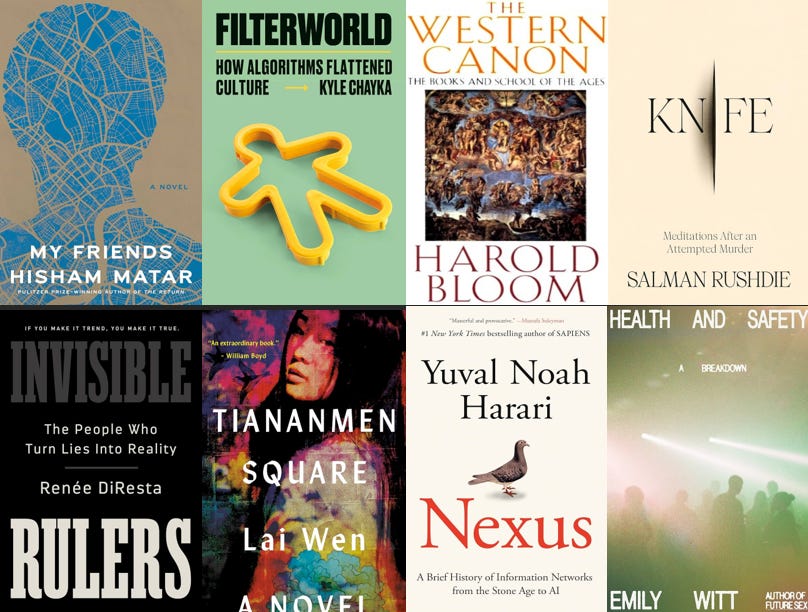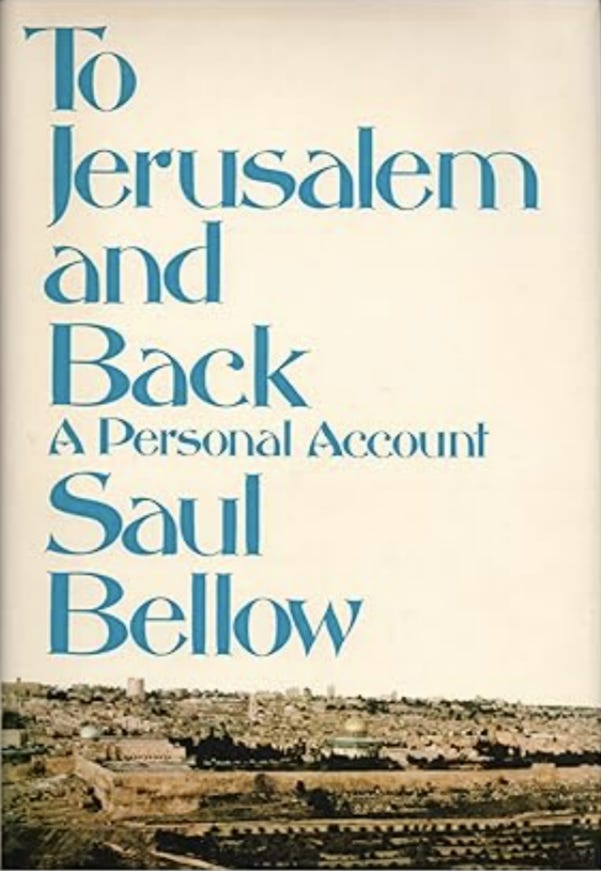Book Reviews 2024
If you can spot a theme running through the book reviews I did this year, you know me better than I know myself. Ready, set, go:
Unmoored, City Journal (Jan. 2024). Review of Hisham Matar’s novel My Friends. A compelling story about a group of men who become friends while exiled from their native Libya in the Gaddafi years. Both a book of postcolonial literature and a book about postcolonial literature. It meditates on some of the greats of the genre, such as Jean Rhys and Tayeb Salih, and I do in my review as well. “Exile,” the novel’s protagonist claims, is “a thermometer of our times.” In the West, “many of us”—this is now my review—“live in-between lives in what is now an in-between society.” And so—I conclude—“the problems of postcolonial literature are the problems of our time.”
A Confused Critique of Algorithms, Reason (Jan. 2024). Review of Kyle Chayka’s Filterworld: How Algorithms Flattened Culture. Chayka is the platonic model of a jaundiced hipster, and everything in his torrentially snooty account of online culture flows from there. I’ve already given this book a good kick in the shins in this space—see here. I will say no more.
“Livelier Than You Are, Whoever You Are,” City Journal (Feb. 2024). Review (sort of) of Harold Bloom’s The Western Canon: The Books and School of the Ages. The first half of this one is about Bloom’s defense of Homer, Shakespeare, Cervantes, and other dead white male literary geniuses. The second half is about the cultural revolution that took place at the College Preparatory School (which I attended) starting in 2020. CPS is an elite private school; it is an engine for perpetuating privilege. But! The school has been “decentering whiteness in [its] curriculum.” So although it’s still an inveterately elitist institution, it’s now an “anti-racist” elitist institution. If the aristocrats rhetorically self-flagellate enough, you see, you’re supposed to overlook how they insist on remaining aristocrats. Monique DeVane, the head of school, need not relinquish her white privilege by resigning. Instead, she can just oversee the gutting of the English curriculum. (Who needs The Odyssey when you can study Claudia Rankine’s babblings about white supremacy?) Aided by Bloom’s analysis of the so-called school of resentment, I lament my alma mater’s craven and narrow-minded commitment to appeasing the regressive left—to making everything plodding, puritanical, and boring. “College Prep is not decentering ‘whiteness’ so much as it is banishing difference and strangeness, piety and skepticism, nobility and revolt.”
A Byword for Resistance, City Journal (Apr. 2024). Review of Salman Rushdie’s Knife: Meditations After an Attempted Murder. The account of Rushdie’s 2022 stabbing, and of his recovery from the stabbing, is very good. But the rest of this book is bleh. For example: “One chapter records how Rushdie met, courted, and married the poet Rachel Eliza Griffiths—a matter that loses all romance when retold to the reader, who keeps remembering that this is a man in his seventies, falling for a woman 30 years his junior, who becomes his fifth wife.” Disappointingly, the book does not succeed as a defense of free speech. For that, I refer you to Christopher Hitchens’s account of the original Rushdie affair—the 1989 fatwa—in his memoir, Hitch-22.
Influencers, Bullshitters, and How We Lost a Shared Reality, The Bulwark (June 2024). Review of Renée DiResta’s Invisible Rulers: The People Who Turn Lies into Reality. On this amazing book about the influencers, algorithms, and crowds that drive social media virality, I write: “The reader learns far more than can be summarized here.” And the review is 2,700 words! So doing the book justice here is hopeless. If you’re interested in how social media works, go read it for yourself. You’ll be glad you did. For her invaluable work as an internet researcher, Renée has been targeted—maligned, caricatured, harassed, and even (ridiculously) sued—by a horde of shameless rightwing grifters. But she has taken it all in stride, including by writing about it here with authority and great poise. Invisible Rulers is a stinging indictment of the “censorship industrial complex” industrial complex.
Inspiring, Thrilling, and Confused, City Journal (June 2024). Review of Lai Wen’s novel Tiananmen Square. Writing under a pseudonym, the author recalls her family’s struggles, during her childhood, living under the Chinese Communist Party’s authoritarian thumb. The climactic depiction of the Tiananmen Square Massacre is vivid and searing. Unfortunately, Wen then tries to explain her art, drawing, in a woefully inept epilogue, false parallels between Chinese dissidents being run over by tanks and the prosaic protest movements of comfortable Westerners. A great book that ends on a cheapening note.
The Fantastical Scenarios of Yuval Noah Harari, Reason (Sept. 2024). Review of Yuval Noah Harari’s Nexus: A Brief History of Information Networks from the Stone Age to AI. The label I’d use for Harari’s one-man genre is “pop prophecy.” Vatic, shallow, pretentious, and strange. Harari says AI will probably destroy us, but scratch the surface and it’s just a wild guess.
Blind, but Not Mute, City Journal (Oct. 2024). Review of Emily Witt’s Health and Safety: A Breakdown. This is an absorbing, stylish, charming book written by a crazy person. Witt takes drugs and dances and complains. I wonder if she knows Chayka. They both live in Brooklyn and write for The New Yorker. A pair of talented ingrates.
“The Civilized World Seems Tired of Its Civilization,” City Journal (Dec. 2024). Review (sort of) of Saul Bellow’s To Jerusalem and Back. “If you want everyone to love you,” Saul Bellow wrote, “don’t discuss Israeli politics.” He said that in his 1976 book on the subject. I can say it now, about my essay underscoring the continued relevance of his book. “Bellow climbs into the abyss of the Arab-Israeli conflict, sits with its quandaries, and, impressively, emerges with his cognitive bearing, moral compass, and grace intact.” Or so I believe. I go on to discuss the reputational price Bellow has paid for refusing, in later life, to keep up with the cultural elite’s leftward shift. “He may not have joined the Right, but as liberals lost touch with the civilization that formed them, he accepted being left by the Left.” A strange fate for a novelist who, writing as an immigrant Jew in the mid-twentieth century, started off breaking down literary barriers.
We’ll see how many book reviews I write next year. I do not expect to write nine of them. Then again, I did not expect to write nine of them this year either. Blest hour! It was a luxury—to be!
One more for good measure . . .





